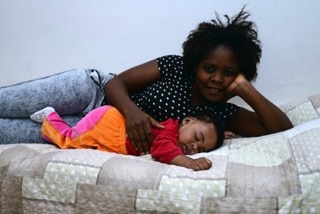Stephanie from Nigeria poses with her daughter Francesca Marina, dubbed “the princess of migrants”, after she was born during an Italian rescue operation off the coast of Sicily.
Dubbed “the princess of migrants”, a Nigerian baby born on the Italian ship that rescued her mother in the Mediterranean has become a symbol of hope for those braving the perilous crossing in search of a new life.
In early May, when the international press was cooing over the birth of Princess Charlotte into the British royal family, the photograph of another baby also landed in the headlines. Tiny Francesca Marina was shown sleeping, nestled in pink gauze, a closed fist resting against her face.
Her mother Stephanie, a 25-year-old hair stylist, had fled Nigeria two years earlier. After falling in love with a compatriot in Libya, she stayed there for a while. But when their relationship fell apart she headed to Italy alone.
“I was nine months pregnant. I had to take the boat, I had no choice, I couldn’t deliver (the baby) in Libya,” she told AFP.
Once the dinghy had set off across the Mediterranean, her contractions began.
“It was really difficult, I was sitting inside with the pain. There were a lot of people in the boat, we were just sitting really tight. The pain was too much.”
The migrants were rescued at night after around eight hours at sea by the patrol boat Bettica and it was there that Francesca Marina, named in honour of Pope Francis and her Italian rescuers, was born.
Stephanie does not really remember it: she fell unconscious and did not come to until she was at the hospital where she had been transported by helicopter.
The Italian authorities were also unaware of what had happened.
Pregnant Stephanie was rescued along with other migrants after around eight hours at sea by the patrol boat Bettica, where Francesca Marina was born (AFP Photo/Giovanni Isolino)
Although the captain of the Bettica recorded the birth in the ship’s logbook, neither the port authorities who review the logbook, nor the medical services passed on the information to the authorities, setting off a bureaucratic odyssey.
When Stephanie and her baby arrived at their current reception centre in Sicily — from where they would make their asylum request — their file was almost empty, said the centre’s director Antonio La Monica.
It took months of phone calls and several newspaper articles on the subject for any progress to be made, but finally Francesca was given her tax identification number — without which all doors remain closed in Italy.
Officially, aboard the Bettica is considered Italian territory, but as Italian law does not allow birthright citizenship, Francesca is Nigerian like her mother.
“This princess of migrants is a symbol for everyone, and a birth during a journey is special,” La Monica said.
“Francesca’s story is typically Italian. It is a story of big hearts, where her welcome exceeded everyone’s expectations. But every step of the way there has been a little something missing,” La Monica said.
“We are very good at welcoming, but we need to become even better at integrating,” he added.
The reception centre houses around 15 women, almost all of them Nigerian, most of whom wile away the empty hours on their smartphones, chatting or doing each other’s hair while they wait for their asylum applications to be processed.
Francesca is passed from one to the other, winning the women’s hearts with her easy smile. Her mother, along with others, is taking Italian and cultural lessons to ready herself and her daughter for their new life in Italy.
“She is so sweet… but it’s difficult, everything is first time. First time I have a baby, first time in Italy, every experience is just the first time. But I believe I can cope,” her mother said.
Last week before the UN General Assembly in New York, Italy’s Prime Minister Matteo Renzi spoke about Francesca and other babies born on Italian rescue boats.
“Diabam, Salvatore, Idriss Ibrahim, Francesca Marina… I would like these names to be associated with the names of those who didn’t make it,” to remind the world “of the extent of the challenge” posed by the migrant crisis, he said.
